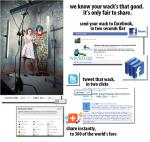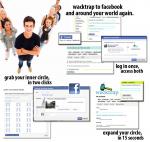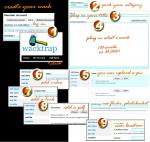What’s your story?
Share and find customer experiences
Connect with the people behind them
Wacktrap is
feedback made social
Trending Content
Google App Fails 700,000 Voters Possibly Sent Wrong Election Day Polling Place
by hearit
The search engine giant responsible for helping people find things appears to be receiving an epic fail for its “Google Election Center” app: Google may have accidentally sent a lot of voters to wrong polling places Election Day 2010—700,000 or more people in 12 states.
A company known as “Aristotle”--key competitor to Google with its own ballot box location--is among the first source to have spotted the “Google Election Center” app error, bringing the glitch to attention quickly. “Fast Company” also noted the Google glitch—and it has a theory that even more than 700,000 voters could have been steered wrong.
Right now, current estimates--including Fast Company's--place the numbers at roughly 727,00 voters that could have been directed to incorrect polling place locations by the Google app. The state with the largest possible wrong polling place locations, of the twelve states used in the study which found the glitch, is Washington state.
“Aristotle”, a 25-year-old political technology company, noticed the Google glitch in the search engine giant’s app that includes a feature for locating voter polling places--discovering the Google error after selecting 12 regions and states for its study including Arkansas, Hawaii, Iowa, Kansas, Maryland, Mississippi, Montana, Nebraska, North Carolina, Virginia, Washington and the District of Columbia.
The “Aristotle” company ran a series of simulations in about 1,000 homes in the twelve different states chosen. That data was then compared against Google's “Google Election Center” app, with major discrepancies discovered, the company stating:
“Aristotle premised its prediction on a series of simulations. The company selected about 1,000 households in [12] targeted states, compared their [those states’] polling place data against Google's [Google Election Center] app and derived an error rate it later used to predict the number of area households possibly affected by the mishap.”
That “error rate…later used to predict the number of area households possibly affected by the [Google app] mishap” added up to a lot: roughly 700,000 voters that could've been provided the wrong polling place.
To simplify, the Google "Election Center" app was using the voter's residential address in order to provide the user his or her polling place to vote. The method seems to make sense at face value but, as many voters can testify, the specified polling location for a voter isn't always the polling place closest to their home--thus, the error.
The repercussions are obvious: with voters commonly heading to place their vote after work, or shortly before polls close, a wrong polling place address could literally make the difference between a person actually being able to vote on time.
That makes the number of Election Day votes, possibly affected, startling, considering the extremely tight, 2010 political race.
Aristotle CEO John Phillips told Politico: "If you're [as a voter] being sent to the wrong polling place [by Google], it's a pretty big deal, especially if it's toward the end of the day [near when voting polls are closing], and especially if it's an election that's closely contested like [Election Day] 2010."
Google's “Google Election Center” app is embeddable—meaning it sits on online sites across the internet world, including the likes of powerhouses like the social networking site Facebook. “Google Election Center” draws its data from the Voting Information Project (VIP) and draws data directly from individual election boards also. Where the glitch may have occurred is still not clear.
Fast Company clarifies that the Voting Information Project (VIP) is a program of the Pew Center on the States, drawing data directly from various election agencies around the entire United States country—then making that information available for free to third parties, to use for applications like the “Google Election Center” app tool. For agencies which did not set up a pipeline via the Voting Information Project, Google was receiving polling place information directly from the election agencies themselves.
Google has yet to do a lot of talking on the subject of its “Google Election Center” app glitch—there’s not a lot of acknowledgment going on, obviously no apology. An apology would equal liability, an area from which any company would obviously wish to steer clear. Then again, there’s not an awful lot to say. The app snafu is a major one and less talk is probably better—while it’s not easily foreseeable that the company could or would be held legally responsible for a nationwide voting issue, sometimes very strange things, indeed, can happen. After all, who would have guessed the importance of “hanging chads”.
The search engine giant did release statement at the time, when the app’s glitch was discovered, Google Spokesman Aaron Zamost telling “Politico” that the search engine company was working diligently to fix the polling location problem and "make sure it [Google's app] reflects the most up-to-date [polling place] information provided to us by the board of elections." Really, what else could the company do? Sometimes things go wrong—and sometimes things go wrong in a major, major way. With technology issues, fixing a glitch in as timely a manner as possible is often the only solution—unfortunately for Google, timing with this issue tended to be really bad, with only a matter of hours in any Election Day.
"Aristotle" actually started testing weeks in advance to Election Day. It’s a smaller company’s dream, to take a hack at a giant—and the company appears to have waiting for the day, spreading the Google glitch info far and wide. “Aristotle” says the Google voter glitch struck at least 12 battleground states on Election Day, its CEO stating:
"As millions of Americans went to the polls on Tuesday, Google offered to provide voters with accurate information [via its Google Election Center app] about their [voters'] polling place. Unfortunately, according to investigations by various reporters and observers, and an Aristotle review of the [Google] tool, the [app] technology used likely produced erroneous information for some voters. While we do not know the full scope of the [polling] problem, any mistakes should be reason for concern for Google and for all of us [as voters]. The [political] races decided by razor-thin margins or still hanging in the balance illustrate this point. So does the experience of anyone [any voter] who was directed to the wrong polling place on Election Day" 2010.
Yes, that all may be true, but technology is not without fail. Technology and surgeons tend to have a lot in common: while both have the goal to fix and improve, occasionally, along the path, things can be made worse--and, from those mistakes, we're pushed to improve.
As for "Aristotle", perhaps it should be working on improving its own technology--to actually compete, instead of focusing on weeks of data crunching.
SPEED UP YOUR ONLINE GROWTH
How To Wack
Take the Tour
Click on any image to start












